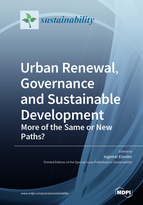Urban Renewal, Governance and Sustainable Development: More of the Same or New Paths?
A special issue of Sustainability (ISSN 2071-1050). This special issue belongs to the section "Sustainable Urban and Rural Development".
Deadline for manuscript submissions: closed (15 June 2021) | Viewed by 30825
Special Issue Editor
Interests: urban governance; sustainable development; environment and democracy; spatial segregation; politics and religion; securitization and counter-securitization
Special Issue Information
Dear Colleagues,
In the wake of the 1992 Earth Summit in Rio, and the 1996 Habitat II Conference in Istanbul, the world experienced a worldwide movement addressing sustainable development. A period of technological optimism followed, stimulating urban renewal initiatives signposted by catchwords such as “transition town”, “virtual cities”, and “Oekostadt”. Reflecting growing sociospatial inequalities, and political polarization, the social dimension gradually became visible on the agenda advertised by labels such as “just city”, “healthy city”, and “inclusive city”. Today, “slim”, “slow”, “de-growth”, and “Lo-Tek” cities are among alternatives to the still strong technodigital strand of urban renewal visions.
The Covid-19 pandemic turned things upside down. Adding climate change, the accelerating extinction of species, and the refugee crisis, humanity now finds itself in a “perfect storm” posing enormous challenges. Although world leaders are desperately fertilizing their economies with heaps of money to re-invent “the Great Acceleration”, there are in this “critical juncture” windows of opportunity to enter new paths. How do urban public institutions and actors in market and civil society respond to the pandemic and other crises? Do they just try to reinvent old ideas and practices, or do they search for healthier, more democratic and sustainable ways of handling major threats and risks?
As the causes, effects, and adequate reactions are contested, there are no given solutions regarding how to “de-securitize” perceived threats one by one, no less together. Governance research has become strikingly multifaceted in terms of theory, methods, and empirical focus. This Special Issue of Sustainability asks for contributions addressing innovative governance responses to current epidemiological, social, ecological, political, and economic challenges. Encouraging theoretical and methodological plurality, the call welcomes contributions addressing urban renewal, governance, and sustainability ideas and practices in the form of conceptual reflections, single case studies, comparative studies or broader overviews in various national contexts.
Prof. Dr. Ingemar Elander
Guest Editor
Manuscript Submission Information
Manuscripts should be submitted online at www.mdpi.com by registering and logging in to this website. Once you are registered, click here to go to the submission form. Manuscripts can be submitted until the deadline. All submissions that pass pre-check are peer-reviewed. Accepted papers will be published continuously in the journal (as soon as accepted) and will be listed together on the special issue website. Research articles, review articles as well as short communications are invited. For planned papers, a title and short abstract (about 100 words) can be sent to the Editorial Office for announcement on this website.
Submitted manuscripts should not have been published previously, nor be under consideration for publication elsewhere (except conference proceedings papers). All manuscripts are thoroughly refereed through a single-blind peer-review process. A guide for authors and other relevant information for submission of manuscripts is available on the Instructions for Authors page. Sustainability is an international peer-reviewed open access semimonthly journal published by MDPI.
Please visit the Instructions for Authors page before submitting a manuscript. The Article Processing Charge (APC) for publication in this open access journal is 2400 CHF (Swiss Francs). Submitted papers should be well formatted and use good English. Authors may use MDPI's English editing service prior to publication or during author revisions.
Keywords
- urban renewal
- governance
- crisis
- risk
- pandemic
- window of opportunity
- just city
- healthy city
- democratic city
- sustainable city






